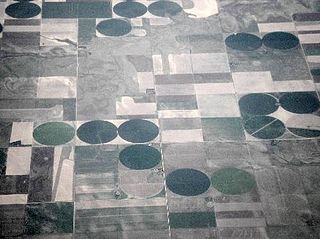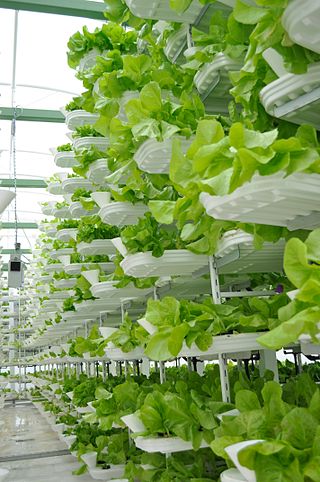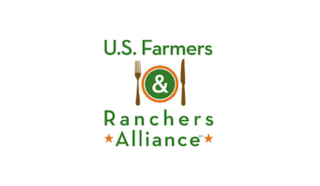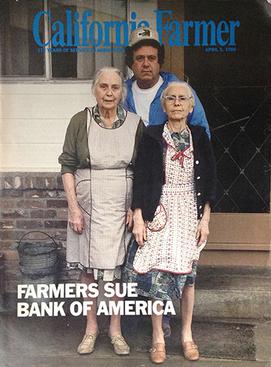
A farm is an area of land that is devoted primarily to agricultural processes with the primary objective of producing food and other crops; it is the basic facility in food production. The name is used for specialized units such as arable farms, vegetable farms, fruit farms, dairy, pig and poultry farms, and land used for the production of natural fiber, biofuel, and other commodities. It includes ranches, feedlots, orchards, plantations and estates, smallholdings, and hobby farms, and includes the farmhouse and agricultural buildings as well as the land. In modern times, the term has been extended so as to include such industrial operations as wind farms and fish farms, both of which can operate on land or at sea.

Organic farming, also known as ecological farming or biological farming, is an agricultural system that uses fertilizers of organic origin such as compost manure, green manure, and bone meal and places emphasis on techniques such as crop rotation and companion planting. It originated early in the 20th century in reaction to rapidly changing farming practices. Certified organic agriculture accounts for 70 million hectares globally, with over half of that total in Australia. Biological pest control, mixed cropping, and the fostering of insect predators are encouraged. Organic standards are designed to allow the use of naturally-occurring substances while prohibiting or strictly limiting synthetic substances. For instance, naturally-occurring pesticides such as pyrethrin are permitted, while synthetic fertilizers and pesticides are generally prohibited. Synthetic substances that are allowed include, for example, copper sulfate, elemental sulfur, and veterinary drugs. Genetically modified organisms, nanomaterials, human sewage sludge, plant growth regulators, hormones, and antibiotic use in livestock husbandry are prohibited. Organic farming advocates claim advantages in sustainability, openness, self-sufficiency, autonomy and independence, health, food security, and food safety.

Slow Food is an organization that promotes local food and traditional cooking. It was founded by Carlo Petrini in Italy in 1986 and has since spread worldwide. Promoted as an alternative to fast food, it strives to preserve traditional and regional cuisine and encourages farming of plants, seeds, and livestock characteristic of the local ecosystem. It promotes local small businesses and sustainable foods. It also focuses on food quality, rather than quantity. It was the first established part of the broader slow movement. It speaks out against overproduction and food waste. It sees globalization as a process in which small and local farmers and food producers should be simultaneously protected from and included in the global food system.
Gourmet magazine was a monthly publication of Condé Nast and the first U.S. magazine devoted to food and wine. The New York Times noted that "Gourmet was to food what Vogue is to fashion." Founded by Earle R. MacAusland (1890–1980), Gourmet, first published in January 1941, also covered "good living" on a wider scale, and grew to incorporate culture, travel, and politics into its food coverage. James Oseland, an author and editor in chief of rival food magazine Saveur, called Gourmet "an American cultural icon."

Vertical farming is the practice of growing crops in vertically stacked layers. It often incorporates controlled-environment agriculture, which aims to optimize plant growth, and soilless farming techniques such as hydroponics, aquaponics, and aeroponics. Some common choices of structures to house vertical farming systems include buildings, shipping containers, underground tunnels, and abandoned mine shafts.

Joel F. Salatin is an American farmer, lecturer, and author.

Hobby Farms is a bimonthly magazine, devoted to the life of hobby farmers, homesteaders and small producers. Its editorial offices are based in Lexington, Kentucky. Hobby Farms magazine's tagline is "Rural Living for Pleasure and Profit". The magazine is known for its award-winning design and photography.

In New York City, there is an extensive water supply system that supports several programs and infrastructure pertaining to the city's food supply. City officials, agencies, and organizations cooperate with rural farmers to grow food more locally, as well as protect waterways in the New York metropolitan area. The New York City Department of Education operates a school-time and summertime breakfast/lunch program. The city is also deprived of supermarkets in several neighborhoods, and the city government has addressed the problem by allowing extra street vendors to operate. To encourage food safety, the government also operates a restaurant-grading system that it introduced in 2010. The various food programs have made the city a model for food systems internationally.

Food, Inc. is a 2008 American documentary film directed by Robert Kenner and narrated by Michael Pollan and Eric Schlosser. It examines corporate farming in the United States, concluding that agribusiness produces food that is unhealthy in a way that is environmentally harmful and abusive of both animals and employees. The film received positive reviews and was nominated for several awards, including the Academy Award for Best Documentary Feature and the Independent Spirit Award for Best Documentary Feature. A sequel is in the works and is scheduled to be released in late 2023.
Sarah Gray Miller is a former editor-in-chief of the American monthly lifestyle and decorating magazine Country Living, a Hearst Corporation publication. She later became editor of Modern Farmer, and currently serves as editor of Saveur.
Practical Farm Ideas is a printed magazine covering all aspects of agriculture. Published four times a year by MIDO Publications, the content features agricultural machinery devised and built by farmers in their workshops. Many of these one-off innovations have wide application in the industry. The purpose of the magazine is to disseminate these ideas so that all farmers can learn about them and benefit.
Garden & Gun is a national magazine focusing on the American South. The magazine reports on the South's culture, food, music, art, literature, and its people and their ideas. It was created in 2007, published by the Evening Post Publishing Company. Since 2008, it has been owned by the Allée Group LLC. The company also produces the Whole Hog podcast, several books, the Fieldshop retail store, the Garden & Gun Club restaurant, and about 75 events each year.

Nature's Harmony Farm LLC is an artisanal cheese operation located in Elberton, Georgia.
Nina F. Ichikawa is an American writer, agricultural activist, and the executive director of the Berkeley Food Institute.
Contract farming involves agricultural production being carried out on the basis of an agreement between the buyer and farm producers. Sometimes it involves the buyer specifying the quality required and the price, with the farmer agreeing to deliver at a future date. More commonly, however, contracts outline conditions for the production of farm products and for their delivery to the buyer's premises. The farmer undertakes to supply agreed quantities of a crop or livestock product, based on the quality standards and delivery requirements of the purchaser. In return, the buyer, usually a company, agrees to buy the product, often at a price that is established in advance. The company often also agrees to support the farmer through, e.g., supplying inputs, assisting with land preparation, providing production advice and transporting produce to its premises. The term "outgrower scheme" is sometimes used synonymously with contract farming, most commonly in Eastern and Southern Africa. Contract farming can be used for many agricultural products, although in developing countries it is less common for staple crops such as rice and maize.

The U.S. Farmers and Ranchers Alliance is an alliance of agriculture related interest groups and organizations that promote industrial agriculture in the United States. Their aim is to promote a positive image of modern agricultural practices. They are supported by checkoff funds from the United States Department of Agriculture and by cooperate donations. The alliance has been criticized for a bias towards corporate agricultural practices.

California Farmer (1854-2013) was the state of California's leading farm magazine for more than a century.

Vivian Howard is an American chef, restaurateur, author and television host. From 2013 to 2018, Howard hosted the PBS television series A Chef's Life focusing on the ingredients and cooking traditions of eastern North Carolina — using the backdrop of the Chef & the Farmer restaurant in Kinston, North Carolina, which Howard co-owned with her then-husband and business partner, artist Ben Knight.
Agriculture is a major component of the New York economy. As of the 2012 census of agriculture, there were over 35,000 farms covering an area of 7 million acres (28,000 km2) which contributed $5.4 billion in gross sales value and $1.2 billion in net farm income to the national economy. Dairy farming alone accounted for $2.5 billion or 45% of sales. The Finger Lakes region is the center of state agriculture, and the state is a top-ten national producer of cow milk, apples, grapes, onions, sweet corn, tomatoes, and maple syrup. New York places second in apples next to Washington.
Will Bonsall is an American author, seed saver and veganic farmer who lives in Maine. He is a regular speaker about seed saving, organic farming and veganic farming.












